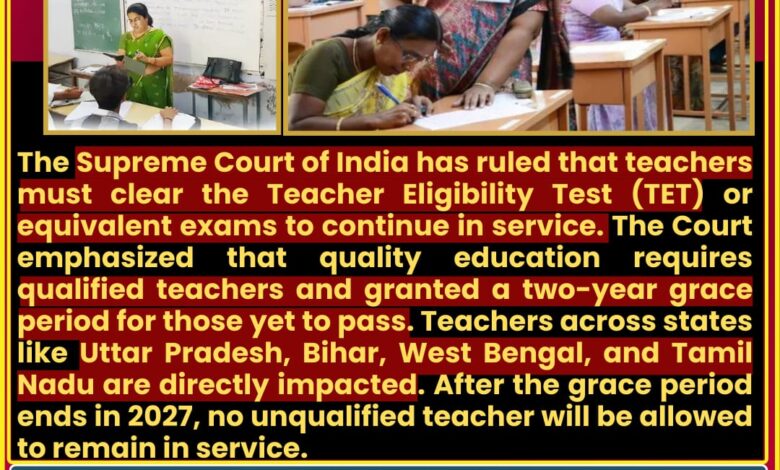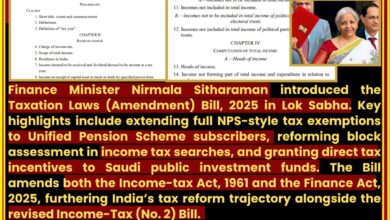
1. SC Enforces Mandatory Teacher Qualification Test
The Supreme Court of India has ruled that teachers across the country must clear the mandatory qualification test to retain their jobs. The decision, announced on August 30, 2025, aims to ensure quality in school education and uphold academic standards nationwide.
2. Teacher Eligibility Test (TET) at the Core
The judgment emphasizes that the Teacher Eligibility Test (TET) or equivalent qualifying exams are essential benchmarks. Teachers who have not cleared these tests cannot be considered fully eligible to hold teaching posts in the long run.
3. Grace Period of Two Years Granted
Recognizing the challenges faced by many serving teachers, the Court has granted a two-year grace period. During this time, teachers who have not yet passed the required test will be allowed to continue teaching, provided they appear for and clear the examination before the deadline.
4. Thousands of Teachers Impacted Nationwide
The ruling affects teachers in government and private schools across India. States like Uttar Pradesh, Bihar, West Bengal, and Tamil Nadu, which have a large number of teachers awaiting qualification, will see significant implications from this decision.
5. Court Highlights Quality of Education
The bench noted that education is a fundamental right of children under Article 21A, and it is the duty of the state to ensure that only qualified teachers are entrusted with the responsibility of shaping young minds.
6. Clarification for Existing Staff
The Court clarified that the decision does not immediately terminate the services of teachers without qualifications. Instead, it provides a structured timeline of two years to qualify, after which continuation in service without certification will not be permitted.
7. Government and Institutions to Facilitate
The ruling also directed state governments and education boards to conduct tests regularly, ensuring teachers have sufficient opportunities to qualify within the prescribed grace period. Training and orientation programs may also be expanded to help teachers prepare effectively.
8. Reactions from Teachers’ Associations
Teachers’ unions across several states welcomed the grace period, saying it provides relief to thousands of staff who were at risk of job loss. However, they also urged the government to make exams more frequent and transparent.
9. Past Precedents in Education Policy
This judgment aligns with earlier policy measures under the Right to Education Act (2009), which had set TET as a mandatory qualification for school teachers. However, enforcement had been inconsistent, leading to several legal disputes.
10. Next Steps for Teachers
Teachers currently without TET certification must register for upcoming sessions to ensure compliance before 2027. Failure to clear the exam within this period could result in termination of service.
Conclusion: A Push for Stronger Academic Standards
The Supreme Court’s decision is seen as a landmark move to raise teaching standards in India. By balancing strict qualification requirements with a two-year grace period, the Court has attempted to safeguard both students’ right to quality education and teachers’ livelihoods.









